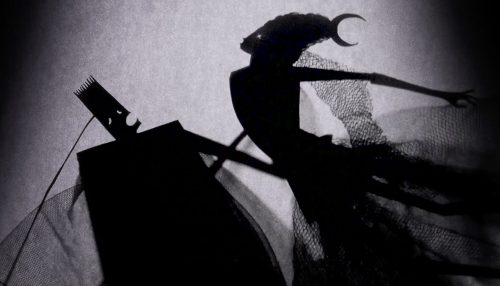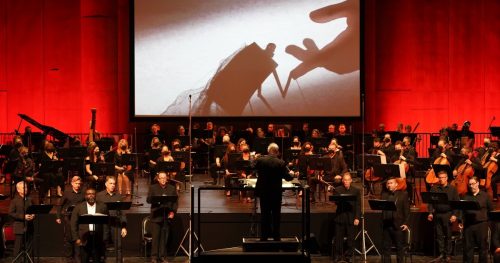 United States Stravinsky, Oedipus Rex: Soloists, Chorus and Orchestra of LA Opera / James Conlon (conductor). Dorothy Chandler Pavilion, Los Angeles, streaming on LA Opera’s On Now digital platform from 17.6.2021. (JRo)
United States Stravinsky, Oedipus Rex: Soloists, Chorus and Orchestra of LA Opera / James Conlon (conductor). Dorothy Chandler Pavilion, Los Angeles, streaming on LA Opera’s On Now digital platform from 17.6.2021. (JRo)

Production:
Libretto – Jean Cocteau (translated into Latin by Jean Daniélou)
English translation of Narrator’s text – E. E. Cummings
Chorus director – Grant Gershon
Animations – Manual Cinema
Lighting – Azra King-Abadi
Director of streaming presentation – Matthew Diamond
Director of photography – Andrew J. Morgan
Cast:
Oedipus – Russell Thomas
Jocasta – J’Nai Bridges
Creon/Messenger – John Relyea
Tiresias – Morris Robinson
Shepherd – Robert Stahley
Narrator – Stephen Fry
LA Opera’s original production of Oedipus Rex, now streaming on their website, is ideal programming for our present moment. A city racked by plague and a populace looking to leadership for guidance forms the backdrop for the events that unfold. Myth and modernity exist side by side in Stravinsky’s music and Jean Cocteau’s rendering of the Oedipus tale. And in this intelligent interpretation, story, music and cinematic art blend together to create a compelling and relevant experience.
Though Stravinsky, in this Neo-Classical opera-oratorio, called for the principals to appear as still as statues, the drama unfolds with raw, emotional power in the hands of superb singers and the LA Opera Orchestra under James Conlon. They are aided, in no small part, by the film direction of Matthew Diamond, who once again proves what an asset he is to LA Opera in their foray into video content.
The opera was performed live for one matinee only, where all health protocols were observed. Fortunately, the streaming version is a work of sensitivity and power and not to be missed if you are a fan of opera, music, art or myth. At just fifty-two minutes, it has all the highs and lows of a three-hour epic.
The art is provided by Drew Dir, Julia Miller and the team at Manual Cinema. Shadow puppets, abstracted figures as psychologically expressive as the German artist Otto Dix’s suffering bodies, enact the drama. At times they create a backdrop for the singers, and at other times they take over the screen to live in their own animated universe. Invention abounds and yet all is understated and at service to the music – no small accomplishment in these days of special effects and the overuse of video projections.
The originality of this Oedipus staging was evident from the first moment with the inspired casting of multi-talented Stephen Fry as narrator. Fry was filmed at Abbey Road Studios in London for both the in-person and digitally streamed versions of the production. He introduces events with tranquility rather than bombast, a reassuring presence who acknowledges the immutable hand of fate.
The Narrator presents the six scenes of the opera in English, while the score is sung in Latin, which in Stravinsky’s mind was more monumental than any derivative language. In his words, ‘it was the most exact and unalterable language’, and surely as unalterable as Oedipus’s fate.

(c) Lawrence K. Ho
An all-male chorus opens the opera, bemoaning the plague that is killing the inhabitants of Thebes and begging Oedipus to save them. The resonance and solemnity of all-male voices sets the tone of the opera and instantly conveys what is at stake for everyone. Oedipus, confident in his brilliance and abilities, tempts fate from the first notes. Russell Thomas, with his warm, luxurious tenor is able to span the great divide from pomposity to self-pity to annihilating shame when the truth is made evident.
The celebratory Gloria chorus introduces Queen Jocasta. She chastises Oedipus, Creon and Tiresias for bickering over domestic problems while their city suffers. With her lushly nuanced voice, J’Nai Bridges sings forcefully to the insinuating and capricious moments of the score. Beautifully expressed, the music grows darker with tinges of surprising sensuality.
The magnetic bass Morris Robinson sings Tiresias; John Relyea is a steely presence in dual roles as Creon and the Messenger; and tenor Robert Stahley proves a poignant shepherd.
As the truth is revealed, horror mounts and the music thunders, but it is soon supplanted by a gentle tribute to ‘Poor King Oedipus’: ‘We loved you. We pity you’, sings the chorus. As Thomas’s puppet counterpart comes to his cruel end, the chorus intones their farewell to Oedipus and a shadow hand reaches out to lead him away – a poignant image to accompany a devastating finale.
Jane Rosenberg
